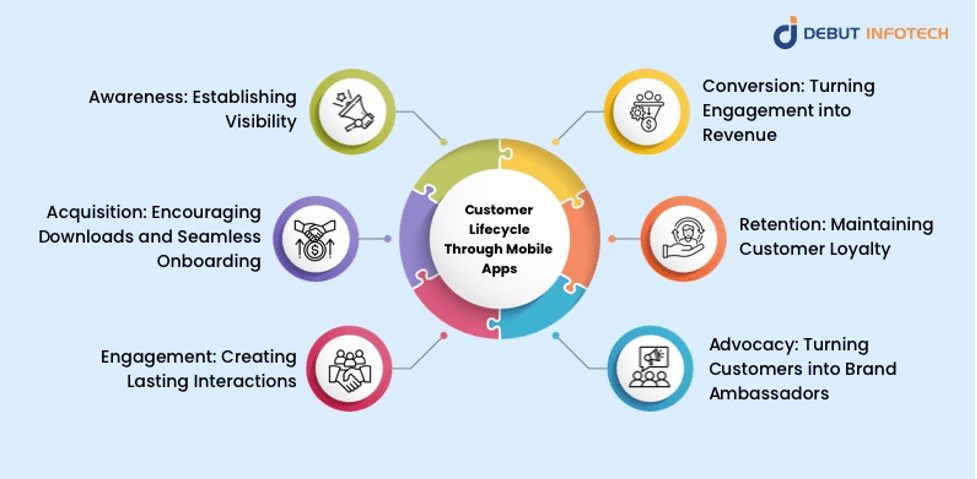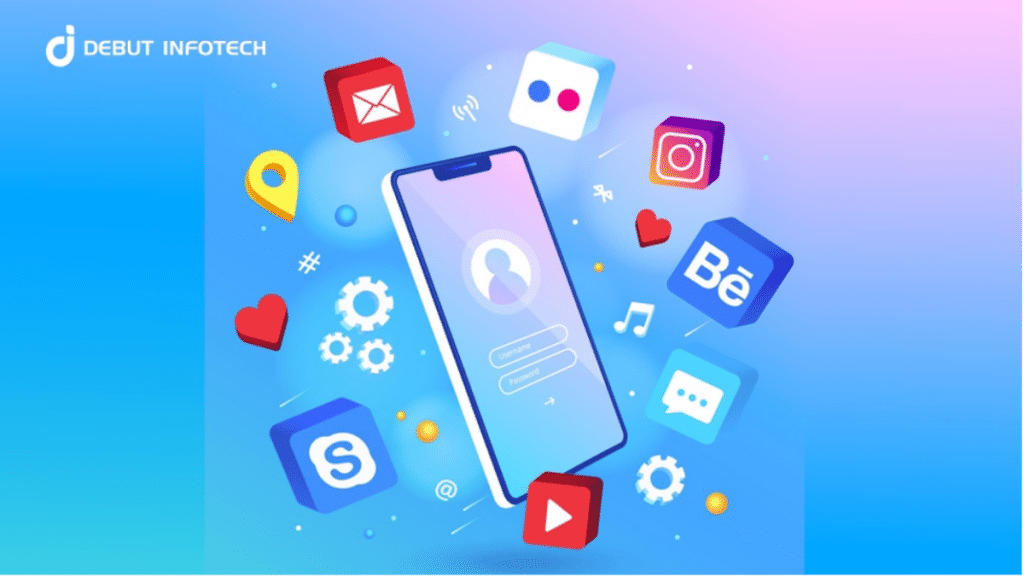Mobile apps are now a must-have for businesses that want to improve customer engagement and increase sales. Research shows that retail app users buy 33% more often, 34% more products, and spend 37% more than those who do not use apps. Furthermore, mobile apps can improve customer engagement with mobile channels by up to 88%.
Consumers expect convenience, personalization, and seamless experiences, and mobile apps give the most convenient methods to do that. Utilizing advanced features, including AI recommendations, real-time notifications, and integrated payment solutions, helps businesses create a stronger customer bond while maximizing revenue potential.
This article elaborates on how a great mobile app can improve engagement and lift sales, giving businesses a competitive advantage in the digital era.
The Impact of Mobile Apps in Customer Engagement
1. Personalized User Experience
Through a mobile app, businesses can customize the content and services different users see based on their preferences, behavior, and interactions. Some features, such as AI-driven recommendations, personalized dashboards, and customized notifications, are also useful. Only top mobile software companies can develop apps with these features.
With data analytics, organizations can optimize their personalization methods so that users are presented with relevant recommendations. This will make them remain engaged with the content for longer periods. Such a level of customization enhances customer bond and long-term brand loyalty.
2. Push Notifications & Alerts
Timely and purposeful notifications help keep users engaged. With it, businesses can send targeted alerts about promotions, new product launches, and important updates. Push notifications can engage users who are not active. It can also be used as a reminder for abandoned carts or exclusive offers. When used correctly, these notifications prompt customers to take action and help them maintain a connection with the brand.
3. Loyalty Programs & Rewards
A good loyalty program increases engagement and retention significantly. Mobile apps allow us to seamlessly integrate reward systems, where users can earn points for purchases, referrals, or engagement. These incentives can then be exchanged for rebates, special merchandise, or elite services, driving customer loyalty. Providing app-exclusive benefits also creates an incentive for customers to keep using the platform, which leads to sales and enhances brand loyalty.
4. Seamless Communication & Customer Support
Mobile apps offer instant communication channels that enhance customer support. This is why businesses utilize robust mobile app development frameworks that can withstand workload.
Capabilities such as in-app interaction bots, intelligent assistant services, and direct messaging offer prompt replies to customer queries. This minimizes frustration and improves satisfaction, which encourages users to revisit.
Moreover, providing self-service channels, such as FAQ sections and automated troubleshooting guides, enables customers to find answers to simple queries on their own, thereby improving their experience.
5. Gamification & Interactive Features
Integrating the elements of gamification with a mobile app can enable users to experience more engagement. Reward-based challenges, leaderboards, and interactive features like AR/VR product trials keep users active and more engaged. These elements inspire not only participation but also a stronger connection between the customer and the brand. Since gamification encourages people to use apps more often, this increases app retention and brand loyalty.
6. Offline Access & Data Synchronization
The best part of a mobile app is that it keeps customers engaged even when they are offline. Offline browsing, saved preferences, and auto-sync capabilities give users the power to interact with the app without the necessity of an internet connection. When they log back in, or move to another device, their activity is synced. They can continue their activity seamlessly. This feature should be incorporated during the app development process. It is useful for businesses offering digital content, e-commerce, or travel services.
7. Social Media & Community Integration
Mobile apps with added social media functionality help engage users to share their usage experiences, write reviews, and participate in discussions. Supporting user-generated content, like reviews or product showcases, can help increase brand trust and draw in more customers. Building a sense of community within the app strengthens customer relationships and keeps users engaged with the brand.
It’s crucial to understand that apps with advanced features often have a high mobile app development cost compared to those with few features.
8. Feedback & Customer Insights
To achieve sustained engagement, it is critical to understand customer preferences and expectations. In-app surveys, feedback forms, and user analytics that help businesses gather valuable insight are made possible with mobile apps. Companies can refine their offerings and improve user experiences by taking action on this data. Soliciting feedback from customers is also an excellent way to get them more involved in the process. This makes them feel more appreciated and they will much more likely remain loyal to the brand and/or product.
How Mobile Apps Boost Sales
1. Convenient Shopping Experience
With features such as one-click checkouts, saved payment information, and personalized product recommendations, a mobile app can make the shopping process as easy as possible.
A simplified user interface minimizes friction, ensuring customers have an easier time browsing, selecting, and purchasing products. When the shopping experience is intuitive and hassle-free, conversion rates will increase naturally. If you plan to venture into mobile app development, you need an app with these features.
2. Data-Driven Insights & Smart Marketing
Businesses can gather valuable customer data through mobile apps, which can then be used to improve marketing strategies. Advanced analytics identify purchasing patterns, user preferences, and peak engagement times.
Using this information, businesses can polish their product offerings and develop promotional campaigns directed to their consumers. AI-powered marketing and personalized promotions can help increase your conversion rates even more.
3. Integration with Payment Options
Modern mobile apps also support a range of payment methods, such as digital wallets, BNPL (Buy/Pay Later) services, and cryptocurrency transactions. When businesses offer numerous payment methods, they provide a frictionless checkout experience, as well as reduce cart abandonment rates. The convenience of secure, one-tap payments enhances customer satisfaction, and customers will be more likely to finalize their purchases.
4. Mobile-Exclusive Discounts & Offers
Businesses often use app-only deals and limited-time promotions to drive sales. Special discounts for mobile users can create an incentive to download the app and use it more often. In addition, flash sales, loyalty rewards, and personalized discount codes all help to encourage repeat purchases. This ultimately increases overall revenue.
Understanding the Customer Lifecycle Through Mobile Apps

Customer lifecycle covers all stages in a user’s journey, from discovery to post-purchase engagement. Mobile apps play a significant role in optimizing every stage. They help maintain an intuitive experience while building brand loyalty.
When businesses strategically align app features with these stages, they can create meaningful interactions that increase app engagement and long-term success.
1. Awareness: Establishing Visibility
The awareness stage is where potential customers first encounter your brand. A well-optimized mobile app increases visibility through:
- In-App Content: Deliver valuable insights, blog posts, or product previews to capture interest.
- Social Media Integration: Encourage seamless sharing and engagement across platforms.
- App Store Optimization (ASO): Optimize app descriptions, keywords, and visuals to improve discoverability.
Leveraging these tools ensures your app stands out in a crowded marketplace, attracting new users and establishing brand recognition.
2. Acquisition: Encouraging Downloads and Seamless Onboarding
After your target customers have heard about your brand, the next step is converting that interest into an app download. This can take the form of access to special offers, limited-time promotions, and early access to unique premium content – creating a point of interest and driving initial use.
A smooth onboarding experience is crucial — users need to see the app’s value as soon as they start. Interactive tutorials, intuitive navigation, and a personalized welcome experience entice users to delve deeper. The easier these initial interactions are, the more likely people will engage in the long run.
3. Engagement: Creating Lasting Interactions
Engagement keeps users connected to your brand, making your app an integral part of their routine. Features that enhance engagement include:
- Personalized Content: AI-driven recommendations tailored to user preferences.
- Push Notifications: Timely reminders, promotions, and updates to sustain interest.
- In-App Messaging: Direct communication channels for support and engagement.
- Gamification: Rewards, challenges, and interactive elements that keep users motivated.
By continuously providing value, businesses can prevent app abandonment and strengthen user relationships.
4. Conversion: Turning Engagement into Revenue
To maximize revenue, businesses must streamline the path to purchase. Effective conversion strategies include:
- One-Click Purchasing: Reduce friction in the buying process.
- Secure Payment Gateways: Build trust with encrypted transactions.
- Limited-Time Offers: Encourage decisive action with exclusive deals.
A seamless purchasing experience minimizes hesitation, leading to higher conversion rates and improved profitability.
5. Retention: Maintaining Customer Loyalty
Sustaining customer interest beyond the initial transaction is vital. Continuous value delivery through regular updates, proactive customer support, and personalized recommendations helps retain users.
Loyalty programs help a lot. Rewards based on repeat purchases, app usage, and referrals all boost retention. This approach involves analyzing user behavior and feedback to ensure that updates are aligned with customer needs, which ultimately strengthens long-term relationships.
6. Advocacy: Turning Customers into Brand Ambassadors
Happy customers make the best promoters. Letting them write reviews, post about their adventures on social media, and partake in referral programs extends the reach of your app even further.
Building advocacy is about more than great features; it is about the consistent delivery of exceeding expectations. Delivering an exceptional user experience makes customers feel appreciated and maintains an emotional connection to the brand.
Case Studies or Real-World Examples
Several leading brands have set the bar high by successfully using mobile to drive mobile app engagement and sales. Retail stars such as Amazon and Starbucks leverage tailored suggestions, loyalty programs, and frictionless payment solutions to encourage repeat business.
Also, smaller, low-level businesses are leveraging mobile apps to improve customer loyalty by providing app-exclusive offers, interactive experiences, and simplified services.
These are case studies on how increased engagement and revenue can be made possible with a good app design.
Conclusion
Having a good mobile app keeps customers engaged and also increases sales.
Through personalized experiences, seamless communication, and convenient shopping, businesses can not only grow customer relationships but are more likely to increase revenue as well.
Investing in an intuitive and feature-rich mobile application provides a long-term advantage. This guarantees continued growth in an ever-more digital marketplace. Businesses that adopt this technology will be better placed to meet the changing customer expectations and drive sustained growth.
Debut Infotech is a well-renowned mobile app development company that helps clients create high-performing apps to increase engagement and sales. By leveraging AI-powered personalization, secure payment integration, and easy-to-use interfaces, Debut Infotech creates innovative solutions tailored to your business goals. Their team is committed to providing a seamless app experience for startups and enterprises alike, which results in improved customer retention and greater business success.
